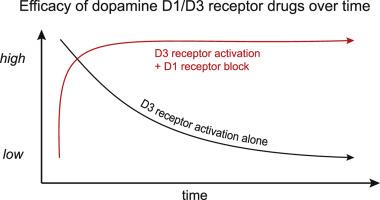Long-term treatment with dopamine D3 receptor agonists induces a behavioral switch that can be rescued by blocking the dopamine D1 receptor |
| |
| Affiliation: | 1. Department of Biobehavioral Health, The Pennsylvania State University, University Park, PA 16802, USA;2. Department of Nutritional Sciences, The Pennsylvania State University, University Park, PA 16802, USA;3. Johns Hopkins University School of Medicine, Baltimore, MD, USA |
| |
| Abstract: | 
Restless legs syndrome (RLS) is commonly treated with the dopamine agonists pramipexole, and rotigotine, which target the inhibitory dopamine receptor subtype D3R. While initially highly effective, these compounds lose their efficacy in treating RLS over time, and long-term therapy regularly leads to a worsening of the symptoms (augmentation). This dopamine agonist-induced augmentation has become a prime concern in the treatment of RLS, and while alternate therapies are being proposed, the mechanisms leading to augmentation remain opaque. Evidence suggests that the prolonged D3R treatment may lead to a hyper-dopaminergic state and involve the excitatory dopamine D1 receptor (D1R) subtype.We here present an animal model in which we can test acute and long-term effects of dopamine D3R agonists in a behavior setting relevant to RLS and in which we can induce a switch of the drug effect similar to the one observed in RLS patients under chronic therapy. We also present evidence that we can reverse this long-term effect by blocking the D1R.Together, data from our new animal model indicate that the mechanisms leading to augmentation in RLS patients after long-term use of the currently used dopamine receptor agonists may be related to a D3R-induced upregulation of the D1R system. As such, our model can be used to assess the interactions between D3R and D1R and unravel the mechanisms that lead to augmentation, and it has the potential to serve as a Launchpad for the development of new pharmacological strategies for the treatment of both RLS and augmentation. |
| |
| Keywords: | Restless legs syndrome Augmentation Long-term treatment Alternatives Animal model |
| 本文献已被 ScienceDirect 等数据库收录! |
|

